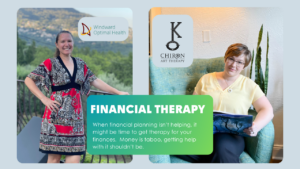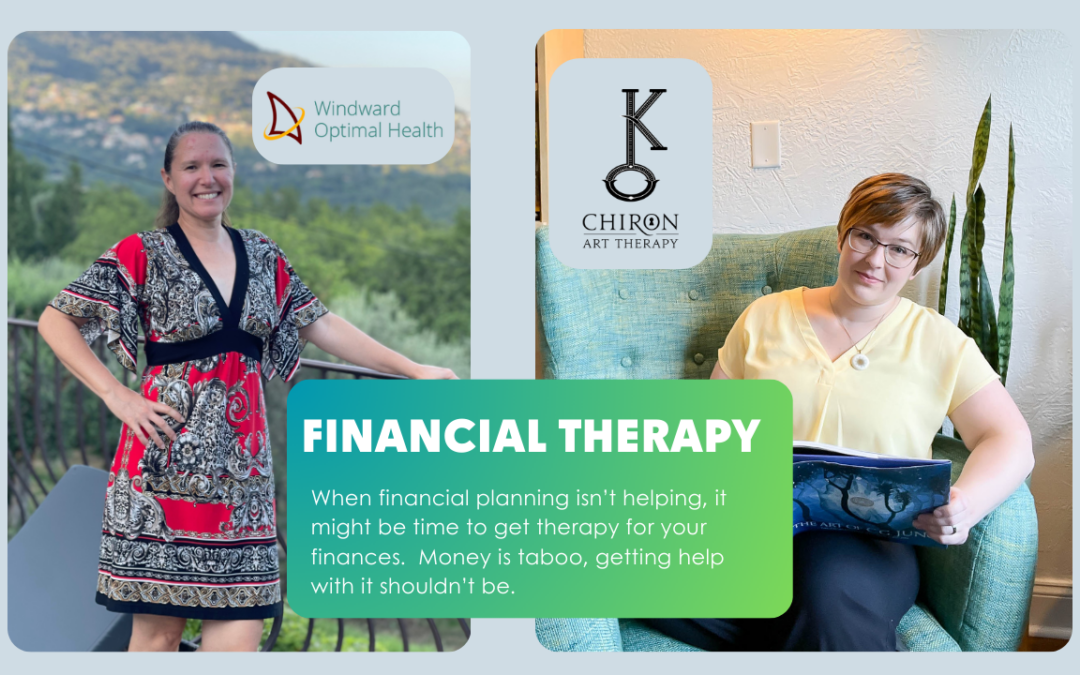You’re not alone. Financial stress isn’t just about numbers—it’s about emotions, patterns, and the beliefs we’ve carried with us for years. And unless we address those deeper layers, no amount of spreadsheets or financial advice will create real change.
How Your Childhood Shapes Your Money Mindset
From a young age, we absorb messages about money—whether it’s the stress of parents arguing over bills, the pressure to save every penny, or the belief that wealth is out of reach. These experiences shape how we think, feel, and behave with money as adults.
If you grew up in a household where money was scarce, you might struggle with fear-based spending habits, hoarding money, or avoiding financial planning altogether. On the other hand, if money was always available but never discussed, you might feel lost when it comes to managing your own finances.
Recognizing these deep-seated beliefs is the first step toward financial healing.
When Financial Planning Isn’t Enough—And Therapy Might Help
Financial planning gives you the strategies, but financial therapy helps you understand why you struggle to implement them. If you’ve ever asked yourself:
- “Why do I feel guilty spending money?”
- “How do I stop sabotaging my finances?”
- “Why do I make bad money decisions even when I know better?”
…then financial therapy might be the missing piece. This is money stress isn’t just about your budget, but it’s more about uncovering the emotional triggers behind overspending, hoarding, or avoidance and learning how to shift those patterns. Dr. Robin Norris, a good friend and colleague of mine and I put together a series on financial therapy, money stress, and some of the less talked about aspects of the overlap of emotions, psychology, and money.
Watch the video here on my Youtube Channel or read the transcript below.
Transcript below:
I am Maggi Colwell with Chiron Art Therapy in Columbus, Ohio.
And I’m Dr. Robin Norris with Windward Optimal Health in Northern Virginia.
We’ve been having an ongoing conversation for a couple years working together on our business and mindset work together. , it’s that idea of surround yourself with people that raise you up, , motivate you and inspire you, and we realized that it made sense to bring this conversation to other people as well.
Would you say that’s, that’s about it, Robin?
Yeah, absolutely agree. There’s been a synergy that we realized has been really helpful for, for us learning and we thought maybe some other people might wanna learn as well.
In this video, we’re breaking down the differences between financial planning and financial therapy. You’ll learn how emotions play into financial decisions, when therapy might be a better fit than coaching, and what questions to ask when seeking financial guidance. Let’s dive in.
One of the things that, that Robin specializes in is financial therapy. And there’s not many financial therapists out there. Are there?
There’s less than a hundred that are certified, and there’s a few more of us that are still finding our way through the field because it’s really been an exciting growing experience.
The whole concept of financial therapy grew out of financial planning. And when people realized there was a lot more than just the numbers involved in money and that money was a lot more of the emotions and dreams and hopes. And so yeah. So there’s a few of us out here and hopefully there’ll be more soon.
Yeah. And I feel like it’s really hard to navigate. In the world we’re living in. What’s the difference between a planner and a coach and trauma informed coaching and what a therapist is and the different types of therapies? It, it’s, I feel like it’s really hard to navigate that. So I feel like us talking today about the difference between what a financial planner does and what’s in the realm of therapy that goes beyond coaching would be a really kind of useful thing for people to listen to.
Yeah, no, I agree. ’cause the field itself is so, engaging in so many different specialties. And sometimes you can get one person that kind of has a CPA and has a a therapy background, but then other times you’ll get somebody who’s a planner but has never done any kinds of therapeutic or coaching.
And so it’s it’s really being able to figure out, well, what questions do I even need to ask because what am I trying to, to look for?
Right? So somebody asking questions. Are we talking about somebody who thinks they may want financial therapy?
Yeah, absolutely. Because they could be somebody that’s talking to their spouse about their budget and they keep meeting with their planner or their accountant and they just feel like they’re not agreeing.
So there’s more emotions in the room than is being sorted out and they wanna go a little bit deeper into their experience. It could be an individual who’s trying to figure out some things that presented itself when they were thinking about inheritance money. There’s sometimes a lot of emotions that come up with, why do I have this money?
Or Why don’t I have this money? You know, why did my sibling get something and not me? So that can dip past the, the realm of a financial planner and more into the realm of a, of a therapist.
So if we were looking at. What is financial planning? What would you include in that? And are we talking about like budgeting and estate planning?
What else would be included?
I would say anything that has financial strategies or technical solutions, so anything that’s actually going to look at your numbers data. Anything that may involve attorneys, like you said estate planning financial planning can absolutely look at what would you like to do with money?
What would you like the money to do for you? You know, if you’re a family that has children, you know, is a college fund something you wanted to discuss is long-term healthcare insurance something you wanna discuss? So it involves things that have hopes and dreams, but it kind of stays at that level of the numbers pieces which is, it’s, it’s, it’s different.
It’s, it’s strategic, it’s objective and it’s more data and goal driven with the numbers.
Now you work a lot with couples too, right? Yes. So. Is there pieces there where a financial planner would be helping work through a couple. So they, they agree on their goals or is that, you know, where does that go into therapy?
Right. If the couple is getting along and is communicating well, a financial planner can stay and work with that couple to, you know, if they have time sort things out, well, what pot of money do we want to save for this vacation? Or what do we wanna do about this second home we might purchase? Where it gets a little bit trickier is when the financial planner starts to feel like, Ooh, I don’t, I don’t know what to do.
There’s a lot of discussion in this room. Well, why did we do this with your parents but not mine? So it’s those kinds of, when the, when the planner feels like they’re squirming in their seat a little bit and it’s starting to feel like a counseling topic, then that’s when it’s helpful to have a counselor or therapist in your, in your pocket.
I think the two things that came to mind for me. If things start to really get heated and you’re starting to feel like a referee that you’re, you know, in crossfire of something. Or if somebody really digs their heels in and is just like, like, can’t even like, look in an open-minded way at other alternatives.
Right. Or even, and they aren’t able to say like, and this is why.
Yes. So it can happen in a couple hood where one person only wants to spend cash does not ever want to use a credit card or any kind of credit even for the larger purchases like a, a car or a home. And a lot of that can come from how you were raised and how you decided you wanted to be as an adult.
The flip side to that can also be, it’s how you were raised and it’s something you don’t know how to change. Right. So I might have been raised in a household where people used credit cards and that was okay, but also there was a lot of sadness and strife because there was a lot of debt, but I don’t know how to save up for something.
We just would go out and go get it. Right. So it’s those kinds of decision points that for sure a financial planner can start to help with, but may also want to refer to a colleague to say, Hey, I think they need a little more discussion time.
I think another piece of that would be if somebody feels stuck.
Yeah. If they are thinking about one aspect of what their situation is and can’t seem to go to a place where you’re forming formulating a plan. Mm-hmm. That, that might be one of those two of Right. That kind of like thought process. That’s kind of circular. Right.
Yeah. Yeah, because A CFP, which is a certified financial planner can meet with people, but the hope from them is that there’s movement forward.
And if they keep coming back in with the same dilemma and they keep coming back in year after year, not agreeing on something, then yeah, maybe there is this spot for being able to have a little bit more discovery discussion.
Okay. Well let’s talk about like falling into a pothole where it’s like your Achilles heel or something of like, things go along and then bang, this thing hits again.
Like, so, you know, when is something like that, something that’s like, oh yeah, we can definitely work through this. It’s like, is it, you know, that it keeps on coming up or is it because there’s an underlying emotional cause, root cause, right. Maybe the client isn’t fully aware of
walk. Exactly. And that’s, that, that’s the key word there is the why.
What is the why behind the behavior? Right? And some behaviors we think are great and told we’re with another person. And then they go, why are you doing that? You are like, well, ’cause it’s what I’ve always done, or it, it makes me feel safe. And so a lot of our potholes can be around, safety can be, I don’t know, it just makes me feel like it should be right.
Like if I’m putting a pen in my hand and it’s the hand that I always write with, I don’t know why I am somebody that writes with this particular hand. So
something That’s right. That’s unquestionable, that’s such a
deep
core value that
Yeah.
You know, you, you feel like kind of shook up even to consider an alternative.
Absolutely. Absolutely. And then I think where it tends to be frustrating for people is when they think they knew each other. I will find that often in couples where they dated for a while, they might have even lived together for a while, then they got married and they still thought they knew each other and then we had our first child.
Now all of a sudden we don’t know each other anymore. But we certainly know a little bit more about how each person was, was raised. Because it seems like when you’re more tired and your resources are more depleted, our true authentic selves come out. And then that’s when we start to, to realize, well, no it is important that we have this value in our household.
Whereas that person might have valued it before and gone out and done this thing. And the partner didn’t, wasn’t bothered by it, but now they are bothered by it because we’ve introduced it to the next generation. So. That can be for sure the qualitative and the quantitative space to spending, you know, do we spend because it’s practical or do we spend, because it’s, it’s an emotional dream.
Do you think we’ve covered what we need to about the difference between the two?
I would say so in the sense that the financial planner aims to create a structured plan to meet the financial goal. And the financial therapist really aims to improve the financial wellbeing by addressing the emotional and the psychological factors.
And so so for a planner or somebody looking for a planner or looking for a therapist, that’s really the best consideration is, am I looking for the numbers to answer my questions or do I have questions that might not be answered by the numbers?
Okay. So that’s getting more into kind of qualitative, would you say at that point, or is that that metaphor not quite work?
I think it does because it really starts to look at what do we want out of life?
Hmm. Okay.
And what does money do for us? And then what do we do for money? Right. And so I do feel like financial planners and financial therapists can work in synergy quite well to help move people towards their own understanding of what the answers are to that, but be more defined.
I started to see in images as like, who are we about? What is our life about? What are we building together and how are we living as a living, breathing unit getting out of the place of mathematics and economics. You know, of course I would say that because I’m an art therapist, so we’ll have to kind of come back around to that a little bit in one of our next videos, because that’s a multi video series.
Yeah. So if you’re interested in what we have to say about, you know, maybe when a financial planner should refer to a financial therapist or talking more about some of those more, you know, emotional aspects and the archetype of money in some of our further videos. So check out our financial video series to find out more about why money stress isn’t just about your budget.

Maggi Colwell
Maggi is a licensed art therapist at Columbus Art Therapy who assists their clients to discover more of themselves through dream analysis, art therapy, shadow work, and depth psychotherapy. They specialize in working with grief and loss as well as c-PTSD. Click the button to sign up for Maggi's newsletter to get notifications about new blogs and upcoming events including workshops, groups, rituals, and art.

